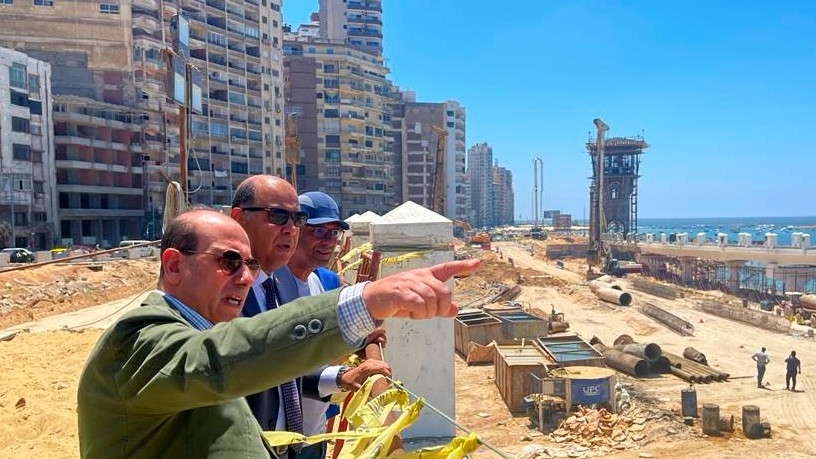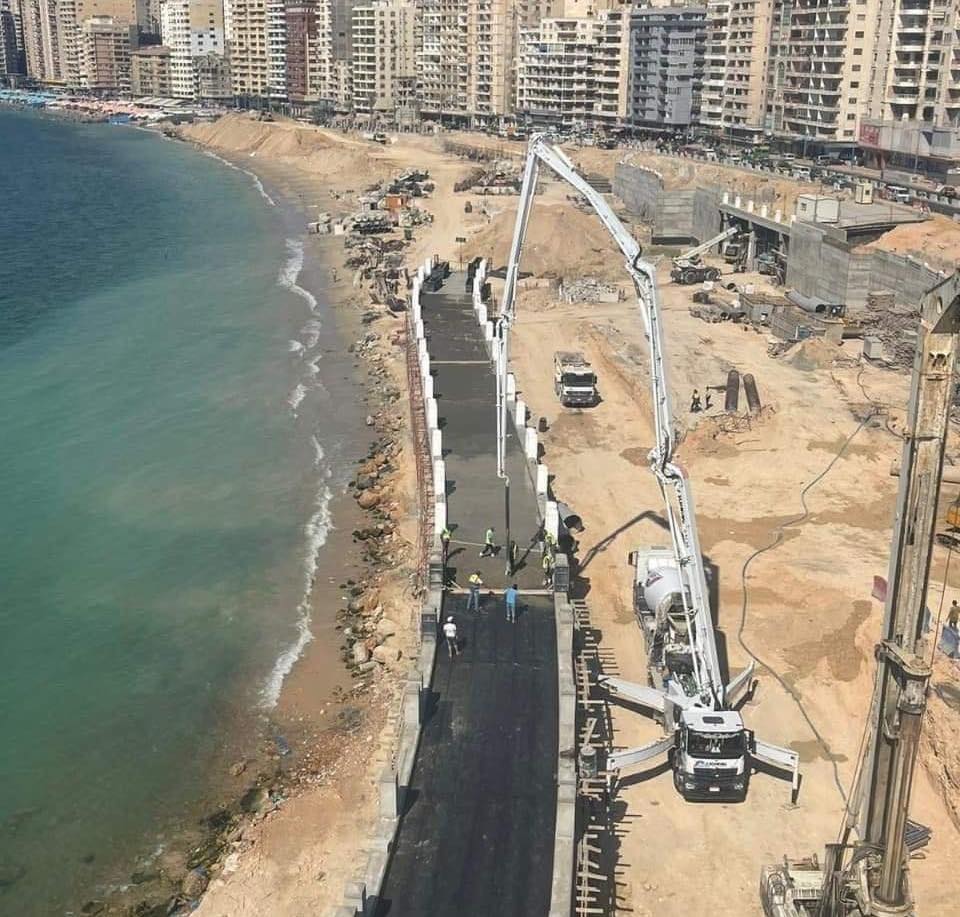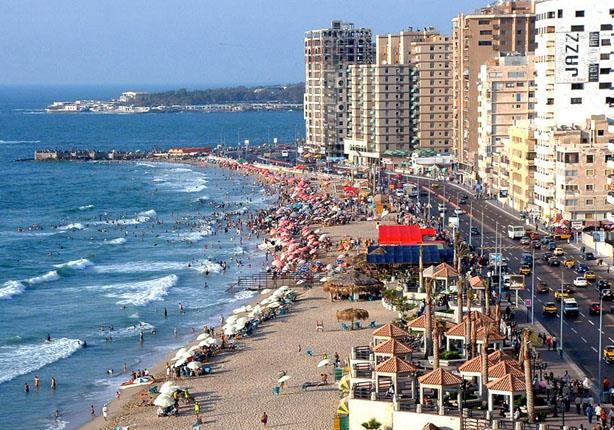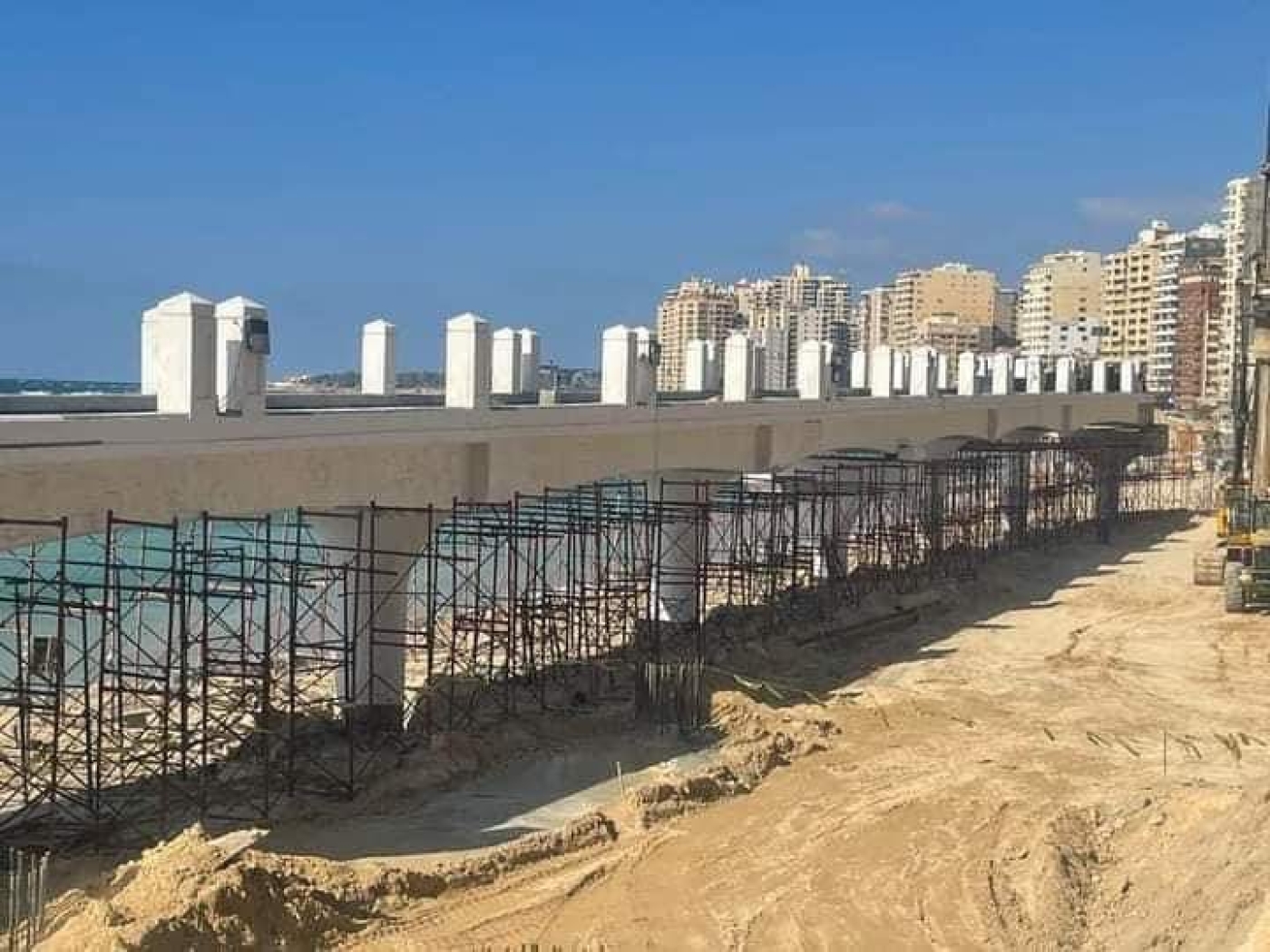'A crime against Egypt': Flyover threatens Alexandria's glittering coastline

Authorities in Egypt's northern coastal city of Alexandria are coming under fire for implementing a flyover project seen by some residents and experts as opening the door for major environmental risks and the destruction of parts of its coast.
The flyover, called Sadat Bridge, is being built in Montazah, one of six districts in Alexandria, in the eastern part of the city.
It is part of a larger scheme to ease traffic in the area that also includes building a tunnel and a footbridge.
Local people accuse the flyover's designers and those implementing it of trespassing on the Alexandria coastline.
"The flyover is tantamount to a crime committed against the coastline in our city," civil servant Wael Idriss, who is a resident of Montazah district, told Middle East Eye. "The beach in this area has already been destroyed and turned into mere blocks of concrete."
New MEE newsletter: Jerusalem Dispatch
Sign up to get the latest insights and analysis on Israel-Palestine, alongside Turkey Unpacked and other MEE newsletters
Alexandria officials defend the project as the product of years of study. They say it is necessary to end traffic congestion in the eastern part of Alexandria, especially during the summer, when the city attracts large numbers of holidaymakers from across the country.
"These projects would be a wonderful addition to the Coastal Road in Alexandria," Montazah municipality head, General Mohamed Sahloul, told MEE, referring to a major east-west highway.
He rejected accusations that the authorities would be turning this part of the coast into a jungle of concrete, noting that the area around and under the flyover would be turned into a promenade where pedestrians could enjoy the sea view.
Major-General Mukhtar Hussein, head of the North Coast Reconstruction Authority, also rejected reports that the project will lead to the closure of the city's popular Beau Rivage Beach so that construction can be carried out.
"The beach remains as it is," he told Masrawy news website on Saturday in response to a social media campaign against the project, which he said would be completed within two months. He added that the beach will remain accessible and visible to pedestrians.
"Whoever walks on the road will see the sea without obstruction, and, for people on the beach, the bridge will serve as an umbrella."
He said it was "unfathomable that we would destroy the beaches of Alexandria".
'Beyond ignorance'
To establish the flyover, the Central Agency for Urbanisation, the executive arm of the Ministry of Housing, had to suspend access to Beau Rivage, the largest and most popular public beach in eastern Alexandria.
The flyover straddles most of the coastline in this area, running over what was a public beach and turning the edge of the coast into part of Alexandria's traffic facilities.
"This is beyond ignorance and a provocation to the people," one objector tweeted.
Another wrote: "Why are they destroying Montazah with its history, heritage and beauty? This is conspiratorial ignorance."
Mohamed Ibrahim Gabr, a professor of urban planning at Ain Shams University, said that ending traffic congestion in the area could have been achieved without encroaching on the coastline in Montazah and destroying one of the most-used public beaches in the area.
"Locals should have participated in proposing solutions to the traffic problem in the area," he said.
As an alternative, Gabr said, the government should have conducted studies on commercial activities that are causing the crowding in the area and considered their relocation while compensating the owners.
Environmental concerns
The project has also caused environmental concerns ahead of the United Nations annual climate summit, COP27, to be held in Egypt's Red Sea resort town of Sharm el-Sheikh in November.
Magdi Allam, secretary-general of the Egyptian Federation for Sustainable Development, has expressed concerns over the environmental effects of the new projects, especially with the flyover infringing on the coast.
"The flyover with its concrete columns can have negative effects on marine life in this area," Allam, also an ex-MP and former senior ministry of environment official, told MEE.
"Fumes from the vehicles using the flyover will worsen these effects."
Alexandria and the neighbouring Nile Delta are poorly placed to withstand the impact of climate change, especially a rise in sea levels, with some parts of the city expected to be submerged by seawater in due course.
Allam said such projects should not be implemented so close to Alexandria's coast.
"This is why agencies concerned with environmental protection should move to prevent these projects," he said.
Vacationers' magnet
Alexandria, known to Egyptians as "Bride of the Mediterranean," is by far the country's most popular resort city, which, apart from its beaches, boasts a large number of ancient landmarks, including a 15th-century fortress and an amphitheatre dating back to the Roman period.
About 300km north of the capital, Cairo, it was the elite's favoured summer vacation spot for many years.
It started to lose its high-end allure as billions of dollars in tourist investments crept into other coastal areas, including Sharm el-Sheikh and Hurghada on the Red Sea and some parts of Egypt's northern Mediterranean coast, including Alamein, a World War II site to the west of Alexandria.
The city is now a favourite destination for middle-class and poorer Egyptians, and hundreds of thousands travel to the city during the summer, from June to September and October, away from the more oppressive heat inland.
Tens of thousands of the city's flats are offered for rent for such vacationers at affordable prices, while dozens of two- and three-star hotels also offer low-cost accommodation.
However, these visitors add to the city's 5.5 million residents, making Alexandria burst at the seams during the summer.
The eastern part of Alexandria is a particular draw, with almost two-thirds of the city's public beaches that have a free-of-charge entry policy located there.
Given the resulting congestion, some residents see the new projects as a good solution to the traffic problems.
"These projects will be ideal solutions to traffic problems and overcrowding in the area, which become intolerable during the summer," one resident, Walid Keshk, told MEE. "Nobody can imagine the suffering people sustain in going to and from work through eastern Alexandria during the summer because of traffic congestion."
Alexandria was founded by Alexander the Great in 331 BCE, and in recent centuries its population remained generally flat. However over the past century its populace has exploded, growing steadily from 1.5 million in 1952 to 5.5 million today. Spread across 2,679 sq km of land, Alexandria is the country's seventh-densest city, even before the summer influx of visitors.
Most of those who want to drive out of Montazah and some of Alexandria's other districts, including Mandara, to join the Coastal Road meet at the intersection of the road and Street 45, creating intense congestion, some of Alexandria's residents pointed out.
One of these referred to numerous previous attempts to put an end to this congestion by the commissioning of traffic officers to organise the traffic better. When the traffic officers failed to bring any semblance of order, "this intersection was then eliminated," he wrote on Twitter.
This article is available in French on Middle East Eye French edition.
Middle East Eye delivers independent and unrivalled coverage and analysis of the Middle East, North Africa and beyond. To learn more about republishing this content and the associated fees, please fill out this form. More about MEE can be found here.







